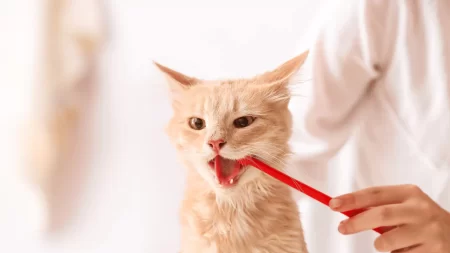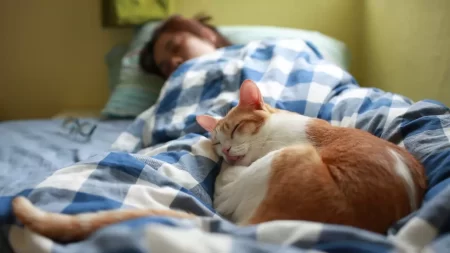Curiosity about consuming cat food? Technically, yes, it’s possible, but certainly not advised.
Cat food, created not for people but for felines, can trigger harmful health implications.
This piece explores the reasons behind cat food’s unsuitability for human consumption, delves into possible risks and health issues related to its intake, and uncovers the immediate and enduring impacts of such an act.
Can Humans Safely Eat Cat Food?
Understanding the Differences in Nutritional Needs
Cats have distinct dietary needs, requiring meat and animal-based nourishment for survival and growth. Essential nutrients for these felines include protein, fat, vitamin A, and taurine, contributing to their development, sight, heart wellness, immunity, and breeding.
Conversely, humans classify as omnivores, consuming a blend of plant and animal sustenance. Their dietary balance encompasses carbohydrates, protein, fat, vitamins, minerals, and fiber. They possess the ability to create vitamin A and taurine from diverse sources, with a reduced necessity for protein and fat compared to cats.
Exploring Potential Risks and Health Concerns
Ingesting cat food might not directly lead to harm, yet it’s far from a healthy or safe selection due to numerous reasons. To begin with, cat food doesn’t adhere to the same regulatory norms as human food. It might incorporate inferior quality ingredients, additives, preservatives, and contaminants unsuitable for people to consume. Moreover, it could get tainted with bacteria, fungi, and parasites potentially causing food poisoning or infections.
Furthermore, cat food may exhibit imbalances in the nutrient profile for humans. For instance, it might contain an excess of vitamin A, which can turn toxic for people if overconsumed, leading to symptoms like nausea, headaches, irritability, and blurred vision. Over time, it can inflict harm on the liver and bones.
Additionally, cat food could possess an excess of protein and fat for human requirements. Overloading protein can burden the kidneys and liver, upping the risk of dehydration, gout, and kidney stones. Too much fat can augment cholesterol levels, thereby boosting the likelihood of obesity, heart disease, and diabetes.
Contrarily, cat food could fall short of some crucial nutrients for humans. For example, it may lack sufficient carbohydrates, fiber, vitamin C, and iron. Carbohydrates provide the primary energy source for humans, helping to balance blood sugar levels. Fiber aids digestion ensures regular bowel movements, and staves off constipation. Vitamin C plays a key role in immune functionality and wound repair. Iron is essential for generating red blood cells and transporting oxygen.
Cat food is made for cats, not humans. It has different nutrients for cats based on their age, size, activity, and health. It is not good for humans who need and like different foods. Cat food may not fill you up or taste good and it may make you want other foods that are better for you.
Why Cat Food Is Not Meant for Human Consumption?
Cat food is made for cats, not humans. It has different nutrients for cats based on their age, size, activity, and health. It is not good for humans who need and like different foods. Cat food may not fill you up or taste good and it may make you want other foods that are better for you.
Cat food does not have all the nutrients that humans need. It may miss some vitamins, minerals, and plant chemicals that are in fruits, vegetables, grains, and beans. These nutrients help humans avoid diseases such as scurvy, anemia, osteoporosis, and cancer.
Cat food may upset your stomach or intestines. It may be too rich or too bland for you. It may also have things that you are allergic or sensitive to such as dairy, gluten, or fish. Eating cat food may cause problems such as bloating, gas, diarrhea, or constipation.
The Effects of Eating Cat Food
Short-term Effects
The short-term effects of eating cat food depend on how much you eat, how often you eat it, and what type of cat food you eat (dry or wet). Some possible effects are:
- Feeling full or sick
- Having a bad taste in your mouth
- Having bad breath or body odor
- Experiencing nausea, vomiting, or diarrhea
- Developing a rash, hives, or itching
- Having a headache, dizziness, or fatigue
Long-term effects
The long-term effects of eating cat food depend on how long you eat it, how much you eat, and what other foods you eat. Some possible effects are:
- Gaining or losing weight
- Developing nutritional deficiencies or excesses
- Damaging your organs such as the liver, kidneys, and bones
- Increasing your risk of chronic diseases such as diabetes, heart disease, and cancer
- Facing legal consequences such as fines or lawsuits
Legal considerations
Consuming cat food isn’t against the law, yet it could provoke legal consequences. For instance, partaking in someone else’s cat food without consent could lead to accusations of theft or intrusion. If you consume contaminated or expired cat food and fall ill, suing the maker or vendor could prove challenging, as they bear no responsibility for human consumption. Should self-injury or harm to others occur due to your consumption of cat food, you could face accountability for these outcomes.
Conclusion
To sum up, eating cat food is not a good idea for humans. Cat food is not for humans and it may hurt your health and cause legal problems. So, you should not eat cat food and eat human food instead. If you want to know how cat food tastes, you can try a little bit sometimes but do not eat it often or instead of your normal food.







